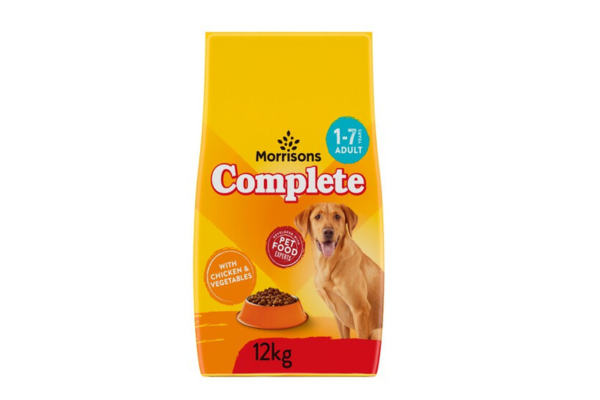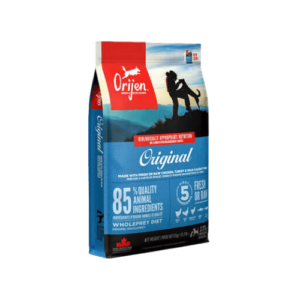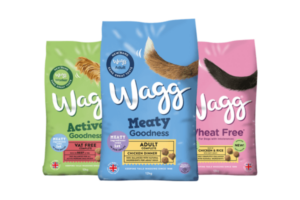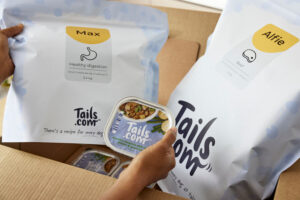If you’ve been browsing the pet food aisles at Morrisons, you’ve likely noticed their range of own-brand dog food options promising complete nutrition at budget-friendly prices. But how does this supermarket staple really measure up when it comes to keeping your canine companion healthy and happy? Let’s dig into what’s actually in those bags and tins to determine whether Morrisons dog food deserves a spot in your shopping trolley.
What is Morrisons dog food?
Morrisons dog food is a private label range produced for the UK’s fifth-largest supermarket chain. Established in 1899, Morrisons has built a reputation for providing affordable everyday essentials, with their pet food line following this same value-focused approach. Their dog food products are manufactured by third-party facilities, typically based in the Netherlands, and rebranded under the Morrisons name.
The range encompasses both dry kibble (like Complete Beef & Veg) and wet food options (including Chicken Pate and Grain-Free Chunks in Jelly). All products are marketed as complete and balanced, containing the basic vitamins and minerals required to meet minimum nutritional standards for adult maintenance.
As a supermarket brand, these products prioritize convenience and accessibility, appealing primarily to budget-conscious pet owners looking for straightforward feeding solutions. Not sure about Morrisons? You might want to read our review on Asda dog food as an alternative protein source that many dogs thrive on.
Product range
Dry dog food
Morrisons’ dry kibble offerings center around their Complete range, available in beef, chicken and other flavor varieties. These products typically contain:
- Cereals as the main ingredient (often listed first)
- Meat and animal derivatives (usually 23-25%)
- Small percentages of vegetables (around 4-5%)
- Added vitamins and minerals
- Preservatives and stabilizers
The packaging highlights that these products are suitable for all breeds and provide 100% complete nutrition. Bag sizes generally range from 2kg to 15kg, with pricing between £2-£15 depending on quantity.
Wet dog food
The wet food selection includes tins, trays and pouches in various flavors and textures. These products typically feature:
Higher moisture content (75-80%) compared to dry food
Slightly higher meat content than the dry options
Some grain-free varieties using starch as alternative carbohydrates
Claims of “no artificial colors or flavors”
Easily digestible protein sources
Morrisons wet foods are marketed as complementary to dry kibble or as standalone meals, with prices ranging from approximately £0.60 to £1.25 per tin.
Ingredient analysis
Examining the ingredients list reveals both strengths and weaknesses in Morrisons’ formulations.
Protein sources
The primary concern with Morrisons dog food lies in its protein quality. Most products rely heavily on “meat and animal derivatives” rather than named meat ingredients. This vague terminology could encompass anything from quality muscle meat to by-products like beaks, feet or intestines.
In their Complete Beef & Veg dry food, for example, the listing shows “meat and animal derivatives (23%, including 4% beef).” This means only a small fraction of the already modest meat content is identifiable beef, with the remaining 19% coming from unspecified sources.
For wet options like Grain-Free Chunks in Jelly, the meat content appears higher (beef 26% and chicken 24%), but still includes generic “pork” at minimal levels (0.6%), suggesting inconsistent ingredient quality.
Carbohydrates and fillers
Cereals dominate the carbohydrate profile in most Morrisons formulations, typically appearing first in ingredient lists for dry foods. These unnamed cereals likely include wheat, corn or other inexpensive grains that provide calories but offer limited nutritional value compared to whole grains or quality alternatives like sweet potatoes.
Even their “grain-free” options substitute cereals with generic “starch,” which may not represent a significant nutritional improvement and could potentially come from less digestible sources.
Fats and oils
Fat sources in Morrisons dog food are typically listed as “oils and fats,” without specifying whether they derive from animal or plant sources. This lack of transparency makes it difficult to assess the quality of essential fatty acids that are vital for coat health, inflammatory response and overall wellbeing.
Higher-quality dog foods typically name specific fat sources (like chicken fat or salmon oil) and include balanced omega-3 and omega-6 ratios. Morrisons products generally lack this level of detail and nutritional optimization.
Additives and preservatives
While Morrisons claims “no artificial flavors or colors” in many products, they do contain additives like:
- Burnt sugar (a coloring agent)
- Various gums and thickeners
- Preservatives to extend shelf life
- Minimal prebiotics like chicory root extract
These ingredients help maintain product consistency and appearance but provide little nutritional benefit compared to natural preservatives like mixed tocopherols (vitamin E) used in premium brands.
Nutritional value
Independent assessments from pet food review sites give Morrisons dog food moderate ratings at best. Their Complete Beef & Veg dry food receives particularly low scores for protein quality (2/10), carbohydrate sources (1/5) and fat sources (2/10).
The typical nutritional profile shows:
Protein: 20-25% (dry matter basis)
Fat: 10-12% (dry matter basis)
Fiber: 3-4%
Moisture: 8-10% (dry) or 75-80% (wet)
These levels meet basic FEDIAF (European Pet Food Industry Federation) requirements for adult maintenance but fall short of optimal nutrition for growing puppies, active breeds or seniors with specific needs.
The reliance on cereals and unspecified protein sources suggests lower digestibility and bioavailability compared to premium foods with named meat ingredients and quality carbohydrates.
Price and value
Morrisons positions its dog food as a budget-friendly option, with pricing significantly lower than premium or specialized brands:
Dry kibble: £0.49-£1.35 per day (based on feeding a medium-sized dog)
Wet food: £0.22-£0.65 per 100g
This affordability makes it accessible for multi-dog households or those facing financial constraints. However, customer reviews note recent price increases, with some tins rising from £1.16 to £1.25, reflecting broader inflation in the pet food market.
When considering value rather than just cost, questions arise about whether the nutritional benefits justify even these modest prices. Dogs may require larger portions of lower-quality food to meet their nutritional needs, potentially offsetting some of the apparent savings.
Customer experiences
Consumer feedback on Morrisons dog food reveals mixed experiences:
Some owners appreciate the convenience and affordability, particularly those with multiple dogs or limited budgets. The availability during regular grocery shopping adds practical appeal for busy pet parents.
However, palatability issues appear common, with forum participants reporting dogs rejecting Morrisons food in favor of alternatives like Chappie. Others note digestive problems such as loose stools or increased flatulence, likely due to the high cereal content and lower digestibility.
Long-term users report satisfactory results for healthy adult dogs with no specific dietary needs, while those with sensitive pets or specific health concerns typically upgrade to specialty formulas with higher-quality ingredients.
What kind of dogs is this food suitable for?
Morrisons dog food is most appropriate for healthy adult dogs without specific dietary requirements or sensitivities. The nutritional profile meets basic maintenance needs for average activity levels but lacks the specialized nutrition required for other life stages.
Specifically, this food is not ideal for:
Puppies – The protein quality and calcium/phosphorus ratios aren’t optimized for healthy growth and development. Puppies need higher protein levels from digestible sources to build muscle and support rapid growth.
Highly active dogs – Working dogs, sport competitors or very energetic breeds require more concentrated nutrition with higher protein and fat levels from quality sources to fuel their activity and support muscle maintenance.
Senior dogs – Older canines often benefit from controlled mineral levels, anti-inflammatory ingredients and joint support supplements not found in basic formulations like Morrisons.
Dogs with sensitivities – The vague ingredients and heavy reliance on cereals make Morrisons unsuitable for dogs with food allergies or digestive sensitivities. Even their “grain-free” options contain potential allergens and low-quality ingredients.
This food is most suitable for budget-conscious owners of adult dogs with robust digestion and no health concerns, particularly as a temporary or emergency option rather than a long-term nutritional foundation.
Is Morrisons dog food good?
As a dog nutrition specialist, I must give an honest assessment: Morrisons dog food is mediocre at best, falling short of what I would recommend for optimal canine health.
The primary issues concern ingredient quality and transparency. The reliance on unspecified “meat and animal derivatives” rather than named protein sources indicates cost-cutting measures that compromise nutritional value. When only 4% of a “beef” formula contains actual beef, with the remaining meat content unidentified, owners cannot make informed decisions about what they’re feeding their pets.
Additionally, the dominance of cereals as main ingredients suggests these formulas prioritize inexpensive fillers over bioavailable nutrition. While not inherently harmful, this approach focuses on meeting minimum standards rather than supporting thriving health.
The lack of beneficial supplements like quality omega fatty acids, prebiotics or joint support ingredients further demonstrates the basic nature of these products. They provide calories and meet regulatory minimums but don’t offer the nutritional optimization found in better-quality options.
That said, Morrisons dog food isn’t necessarily harmful for healthy adult dogs with no specific needs. It’s a budget-friendly option that provides basic nutrition, making it acceptable as a temporary solution or for those facing financial constraints.
For long-term feeding, however, I would recommend investing in higher-quality nutrition with named meat ingredients, quality carbohydrate sources and transparent labeling to support your dog’s health throughout their life.
Looking for truly exceptional nutrition for your dog? Butternut Box came out as number 1 in our comparison of the best dog food options available in the UK. Their human-grade ingredients, customized portion sizing and freshly prepared approach represent the gold standard in canine nutrition. If you want to give your four-legged friend the premium nutrition they deserve, check out our detailed Butternut Box review to see why so many dog owners are making the switch to fresh feeding.






